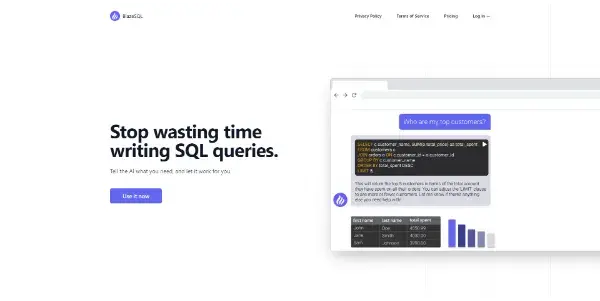Blaze SQL

An AI tool that can generate SQL queries from your text requests. Available in English
Blaze SQL: An AI-Powered SQL Query Generator
Blaze SQL is a free AI-powered tool categorized under developer tools that simplifies the process of generating SQL queries. Instead of writing complex SQL code manually, developers can use natural language (currently English) to describe their data retrieval needs, and Blaze SQL will translate this into accurate SQL code. This significantly reduces development time and allows individuals with limited SQL expertise to access and manipulate database information effectively.
What Blaze SQL Does
Blaze SQL acts as an intelligent intermediary between a user's data request and a database management system (DBMS). It takes a natural language description of the desired data as input and outputs the corresponding SQL query. This eliminates the need for users to understand the intricacies of SQL syntax, focusing instead on the logical aspects of data retrieval.
Main Features and Benefits
Natural Language Processing (NLP): Blaze SQL's core functionality relies on advanced NLP to understand the nuances of user requests. This allows for flexible and intuitive query generation.
Simplified SQL Development: Developers, especially those with limited SQL skills, can significantly accelerate their workflow by using natural language to express their queries.
Reduced Errors: Manually writing complex SQL queries is prone to errors. Blaze SQL's automated generation helps minimize syntax errors and logical inconsistencies, leading to more reliable results.
Improved Productivity: By automating the query generation process, Blaze SQL frees up developers to focus on other critical aspects of software development.
Cross-Database Compatibility (Potentially): While specific database compatibility isn't explicitly stated, the aim of translating natural language to standard SQL suggests potential broad applicability across various DBMSs (though this needs verification).
Use Cases and Applications
Blaze SQL finds applications in a variety of contexts:
Rapid Prototyping: Quickly create SQL queries for testing and experimentation without the overhead of learning complex SQL syntax.
Data Analysis: Generate SQL queries for exploratory data analysis, allowing non-SQL experts to access and analyze database information.
Data Reporting: Generate SQL queries for creating custom reports based on specific criteria described in natural language.
Application Development: Integrate Blaze SQL into application development workflows to streamline data access and manipulation.
Education: A valuable tool for teaching SQL concepts by allowing users to see the direct correspondence between natural language requests and the resulting SQL code.
Comparison to Similar Tools
Several other tools offer similar functionality, but Blaze SQL distinguishes itself through its (currently) free pricing model. Other tools may offer more advanced features, broader language support, or integration with specific platforms, but they frequently come with subscription costs. A direct comparison requires analyzing specific features against competing tools like:
- Other AI-powered SQL query generators: A thorough market analysis is needed to identify all direct competitors and compare features, accuracy, and pricing.
Pricing Information
Blaze SQL is currently offered free of charge. This makes it an attractive option for individuals and organizations seeking an accessible and cost-effective solution for generating SQL queries. However, it's important to note that this could change in the future.
Conclusion
Blaze SQL offers a valuable service to developers and data analysts by simplifying the process of generating SQL queries. Its intuitive natural language interface, combined with its free pricing model, makes it a compelling tool for improving productivity and accessibility within database management. However, potential users should conduct further research to compare its capabilities and limitations against other available tools and consider its potential future pricing model.